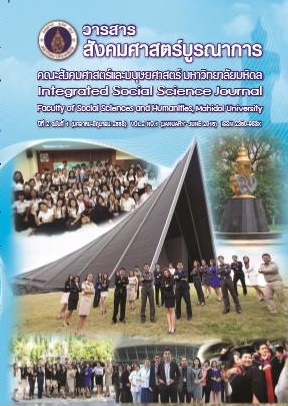จิตสำนึกของประชาชนในการป้องกันและปราบปรามการคอร์รัปชัน กรณีศึกษา ประชาชนที่อาสาสมัครเข้ามามีส่วนร่วมในการป้องกันและปราบปรามการคอร์รัปชัน
Main Article Content
บทคัดย่อ
การศึกษาครั้งนี้มีวัตถุประสงค์ 3 ประการ คือ 1) เพื่อศึกษาระดับจิตสำนึกของประชาชนในการป้องกันและปราบปรามการคอร์รัปชัน 2) เพื่อศึกษาปัจจัยที่มีความสัมพันธ์กับจิตสำนึกของประชาชนในการป้องกันและปราบปรามการคอร์รัปชัน และ 3) เพื่อศึกษาปัจจัยที่สามารถทำนายระดับจิตสำนึกของประชาชนในการป้องกันและปราบปรามการคอร์รัปชัน
กลุ่มตัวอย่างที่ได้จากการศึกษาครั้งนี้ คือ ประชาชนที่อาสาสมัครเข้ามามีส่วนร่วมในการป้องกันและปราบปรามการทุจริตคอร์รัปชันทั่วประเทศ ใช้วิธีการสุ่มตัวอย่างแบบแบ่งชั้น (Stratified Random Sampling) ได้กลุ่มตัวอย่างจำนวน 400 คน เครื่องมือที่ใช้ในการศึกษาครั้งนี้ คือแบบสอบถาม (Questionnaire) และวิเคราะห์ข้อมูลโดยใช้สถิติพรรณนา เพื่อใช้ในการวิเคราะห์ลักษณะเบื้องต้นของกลุ่มตัวอย่าง และสถิติอนุมาน เพื่อหาความสัมพันธ์ระหว่างตัวแปรอิสระและตัวแปรตาม โดยวิเคราะห์สัมประสิทธิสหสัมพันธ์ของเพียร์สัน (Pearson’s Product-moment Correlation) และสถิติการวิเคราะห์ค่าความถดถอยพหุคูณ (Multiple Regression Analysis) เพื่อทดสอบความสามารถในการทำนายของตัวแปรอิสระที่มีต่อตัวแปรตาม ผลการศึกษา สรุปได้ดังนี้
จากการศึกษาพบว่า ปัจจัยภายในตัวบุคคลที่ผลักดันให้เกิดจิตสำนึกในการป้องกันและปราบปรามคอร์รัปชันอยู่ในระดับมาก (ค่าเฉลี่ย 4.22) ด้านอุดมการณ์โดยรวมของกลุ่มตัวอย่างอยู่ในระดับมาก (ค่าเฉลี่ยเท่ากับ 4.38) ด้านความต้องการแก้ไขปัญหาสังคมอยู่ในระดับมาก (ค่าเฉลี่ยเท่ากับ 4.38) ด้านความเชื่ออำนาจภายในตนอยู่ในระดับมาก (ค่าเฉลี่ยเท่ากับ 3.73) ด้านเหตุผลเชิงจริยธรรมอยู่ในระดับมาก (ค่าเฉลี่ยเท่ากับ 4.43) ปัจจัยภายนอกตัวบุคคลที่ผลักดันให้เกิดจิตสำนึกในการป้องกันและปราบปรามคอร์รัปชันอยู่ในระดับมาก (ค่าเฉลี่ย 4.20) ด้านการอบรมเลี้ยงดูอยู่ในระดับมาก (ค่าเฉลี่ยเท่ากับ 4.22) ด้านสถานการณ์ทางสังคมอยู่ในระดับมาก (ค่าเฉลี่ยเท่ากับ 4.24) ด้านแบบอย่างจากบุคคลอื่นอยู่ในระดับมาก (ค่าเฉลี่ยเท่ากับ 4.25) และด้านการขัดเกลาทางสังคมอยู่ในระดับมาก (ค่าเฉลี่ยเท่ากับ 4.11) ปัจจัยระดับจิตสำนึกในการป้องกันและปราบปรามการคอร์รัปชัน ระดับจิตสำนึกพึ่งตนเองอยู่ในระดับมาก (ค่าเฉลี่ยเท่ากับ 4.47) ระดับจิตสำนึกสาธารณะอยู่ในระดับมาก (ค่าเฉลี่ยเท่ากับ 4.73) ระดับจิตสำนึกอาสาสมัครอยู่ในระดับมาก (ค่าเฉลี่ยเท่ากับ 4.57) ระดับจิตสำนึกวีรชนอยู่ในระดับมาก (ค่าเฉลี่ยเท่ากับ 4.14) ระดับจิตโพธิสัตว์โดยรวมกลุ่มตัวอย่างเห็นด้วยอยู่ในระดับมาก (ค่าเฉลี่ยเท่ากับ 4.61)
ผลการศึกษายังพบอีกว่า ปัจจัยภายใน ได้แก่ อุดมการณ์ ความเชื่อในอำนาจตน สามารถร่วมกันทำนายจิตสำนึกของประชาชนในการป้องกันและปราบปรามการคอร์รัปชัน มีค่าสัมประสิทธิ์ของการตัดสินใจ (R Square: R2) เท่ากับ 0.163 และปัจจัยภายนอก ได้แก่ แบบอย่างจากบุคคลอื่น การขัดเกลาทางสังคม สถานการณ์ทางสังคม สามารถร่วมกันทำนายจิตสำนึกของประชาชนในการป้องกันและปราบปรามการคอร์รัปชัน มีค่าสัมประสิทธิ์ของการตัดสินใจ (R Square: R2) เท่ากับ 0.268 สรุปได้ว่า ปัจจัยภายใน และกับปัจจัยภายนอก สามารถทำนายจิตสำนึกของประชาชนในการป้องกันและปราบปรามการคอร์รัปชันได้มากกว่าตัวแปรกลุ่มใดกลุ่มหนึ่งตามลำพัง
Article Details
- วารสารสังคมศาสตร์บูรณาการ มหาวิทยาลัยมหิดล อนุญาตให้สามารถนำไฟล์บทความไปใช้ประโยชน์และเผยแพร่ต่อได้ โดยอยู่ภายใต้เงื่อนไขสัญญาอนุญาต CC Attribution-NonCommercial-NoDerivatives 4.0 International (CC BY-NC-ND 4.0) โดยต้องแสดงที่มา/การอ้างอิงจากวารสาร – ไม่ใช้เพื่อการค้า – ห้ามแก้ไขดัดแปลงเนื้อหา
- ข้อความที่ปรากฏในบทความในวารสารฯ เป็นความคิดเห็นส่วนตัวของผู้เขียนแต่ละท่าน ไม่เกี่ยวข้องกับกองบรรณาธิการวารสารฯ (ซึ่งหมายรวมถึง บรรณาธิการ ผู้ทรงคุณวุฒิในกองบรรณาธิการ หรือ บรรณาธิการรับเชิญ) แต่อย่างใด ความรับผิดชอบองค์ประกอบทั้งหมดของบทความแต่ละเรื่องเป็นของผู้เขียนแต่ละท่าน หากมีความผิดพลาดใด ๆ ผู้เขียนแต่ละท่านจะรับผิดชอบบทความของตนเอง ตลอดจนความรับผิดชอบด้านเนื้อหาและการตรวจร่างบทความเป็นของผู้เขียน ไม่เกี่ยวข้องกับกองบรรณาธิการวารสารฯ
- กองบรรณาธิการขอสงวนสิทธิ์ในการตัดทอน/ปรับแก้ถ้อยคำบางประการเพื่อความเหมาะสม
เอกสารอ้างอิง
ดวงเดือน พันธุมนาวิน. (2550). รูปแบบทฤษฎีปฏิสัมพันธ์นิยม (Interactionism model) และแนวทางการตั้งสมมติฐาน ในการวิจัยสาขาจิตพฤติกรรมศาสตร์ในประเทศไทย. วารสารพัฒนาสังคม, 9 (1), 58-117.
วรากรณ์ สามโกเศศ. คอร์รัปชั่น บ่อนเซาะสังคมอย่างไร. มติชนรายวัน 19 กันยายน 2545; หน้า 6
วันชัย ศรีนวลนัด. (2544). บทบาทของประชาสังคมกับการป้องกันและปราบปรามการทุจริต.กรุงเทพมหานคร: สถาบันพระปกเกล้า.
วิทยพัฒนท สีหา. (2551). ปัจจัยที่สัมพันธ์กับจิตสาธารณะของนิสิตระดับปริญญาตรี มหาวิทยาลัยมหาสารคาม. วิทยานิพนธ์ปริญญาการศึกษามหาบัณฑิต มหาวิทยาลัยมหาสารคาม.
วิศัลย์ โฆษิตานนท์. (2550). การพัฒนาสำนึกสาธารณะของประชาชนในชุมชนเมือง จังหวัดเพชรบูรณ์. ปริญญาศิลปศาสตรดุษฎีบัณฑิต มหาวิทยาลัยนเรศวร.
วีระ สมความคิด และพิศอำไพ คิดชอบ. (2552). การสำรวจสถานภาพองค์กรภาคประชาชนด้านการป้องกันและปราบปรามการทุจริตคอร์รัปชันทั่วประเทศ พ.ศ. 2551. กรุงเทพมหานคร: สถาบันพระปกเกล้า.
แสวง บุญเฉลิมวิภาส และคณะ. (2551). การศึกษาพันธกรณีและความพร้อมของประเทศไทยในการปฏิบัติตามอนุสัญญาสหประชาชาติว่าด้วยการต่อต้านการทุจริต ค.ศ. 2003. กรุงเทพมหานคร: สำนักงานคณะกรรมการป้องกันและปราบปรามการทุจริตแห่งชาติ (ป.ป.ช.).
อัจฉรา โฉมแฉล้ม. (2544). ศึกษาเรื่องจิตสำนึกของนักศึกษามหาวิทยาลัยธรรมศาสตร์ต่อการรวมกลุ่มเพื่อกิจกรรมเพื่อสังคม. วิทยานิพนธ์ปริญญาสังคมสงเคราะห์ศาสตรมหาบัณฑิต มหาวิทยาลัยธรรมศาสตร์.
Adrian Mackay. (2007). Motivation Ability and Confidence Building in People. Amsterdam: Oxford Butterworth-Heinemann.


